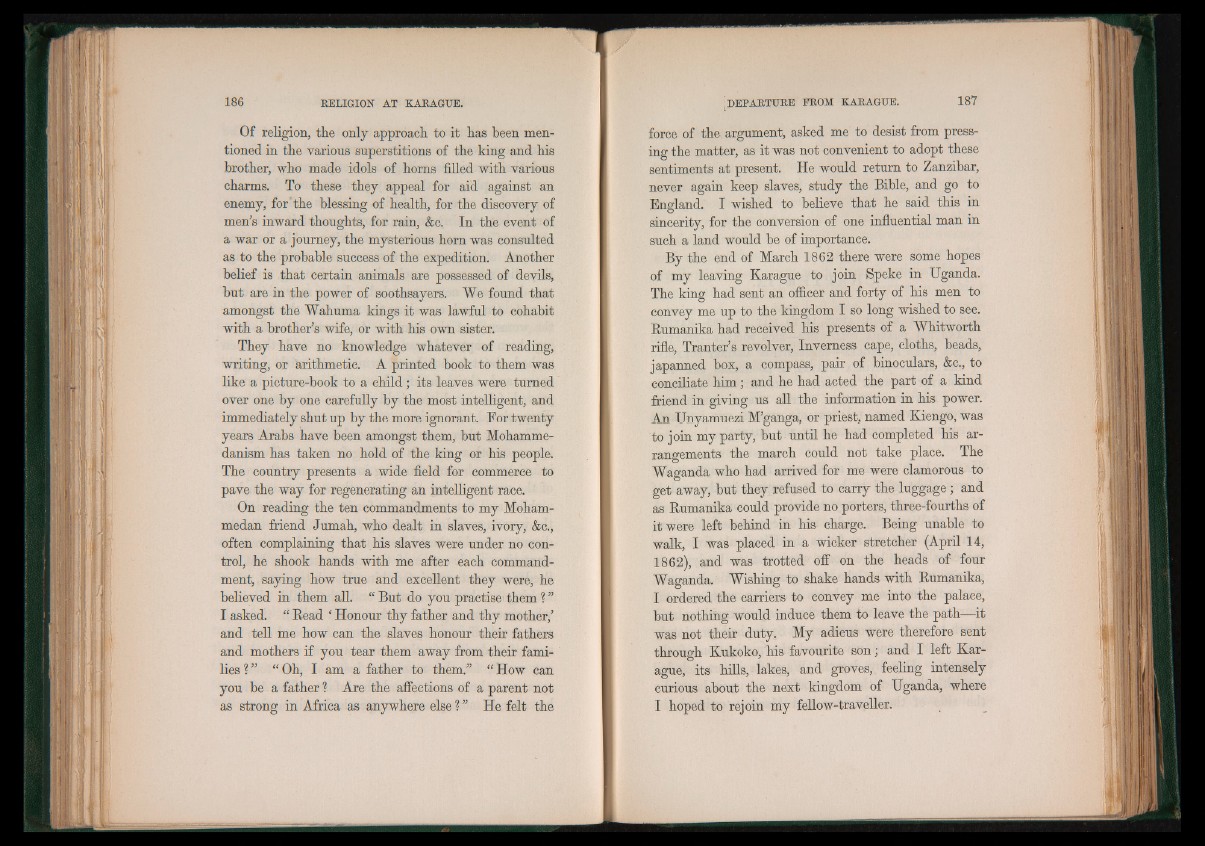
Of religion, the only approach to it has been mentioned
in the various superstitions of the king and his
brother, who made idols of horns filled with various
charms. To these they appeal for aid against an
enemy, for the blessing of health, for the discovery of
men’s inward thoughts, for rain, &c. In the event of
a war or a journey, the mysterious horn was consulted
as to the probable success of the expedition. Another
belief is that certain animals are possessed of devils,
but are in the power of soothsayers. We found that
amongst the Wahuma kings it was lawful to cohabit
with a brother’s wife, or with his own sister.
They have no knowledge whatever of reading,
writing, or arithmetic. A printed book to them was
like a picture-book to a child; its leaves were turned
over one by one carefully by the most intelligent, and
immediately shut up by the more ignorant. For twenty
years Arabs have been amongst them, but Mohammedanism
has taken no hold of the king or his people.
The country presents a wide field for commerce to
pave the way for regenerating an intelligent race.
On reading the ten commandments to my Mohammedan
friend Jumah, who dealt in slaves, ivory, &c.,
often complaining that his slaves were under no control,
he shook hands with me after each commandment,
saying how true and excellent they were, he
believed in them all. “ But do you practise1 them ? ”
I asked. “ Bead ‘ Honour thy father and thy mother,’
and tell me how can the slaves honour their fathers
and mothers if you tear them away from their families
? ” “ Oh, I am a father to them.” “ How can
you be a father ? Are the affections of a parent not
as strong in Africa as anywhere else ? ” He felt the
force of the argument, asked me to desist from pressing
the matter, as it was not convenient to adopt these
sentiments at present. He would return to Zanzibar,
never again keep slaves, study the Bible, and go to
England. I wished to believe that he said this in
sincerity, for the conversion of one influential man in
such a land would be of importance.
By the end of March 1862 there were some hopes
of my leaving Karague to join Speke in Uganda.
The king had sent an officer and forty of his men to
convey me up to the kingdom I so long wished to see.
Bumanika had received his presents of a Whitworth
rifle, Tranter’s revolver, Inverness cape, cloths, beads,
ja.pa.-nnp.fl box, a compass, pair of binoculars, &c., to
conciliate him ; and he had acted the part of a kind
friend in giving us all the information in his power.
An Unyamuezi M’ganga, or priest, named Kiengo, was
to join my party, but until he had completed his arrangements
the march could not take place. The
Waganda who had arrived for me were clamorous to
get away, but they refused to carry the luggage; and
as Bumanika could provide no porters, three-fourths of
it were left behind in his charge. Being unable to
walk, I was placed in a wicker stretcher (April 14,
1862), and was trotted off on the heads of four
Waganda. Wishing to shake hands with Bumanika,
I ordered the carriers to convey me into the palace,
but nothing would induce them to leave the path—it
was not their duty. My adieus were therefore sent
through Kukoko, his favourite son; and I left Karague,
its hills, lakes, and groves, feeling intensely
curious about the next kingdom of Uganda, where
I hoped to rejoin my fellow-traveller.